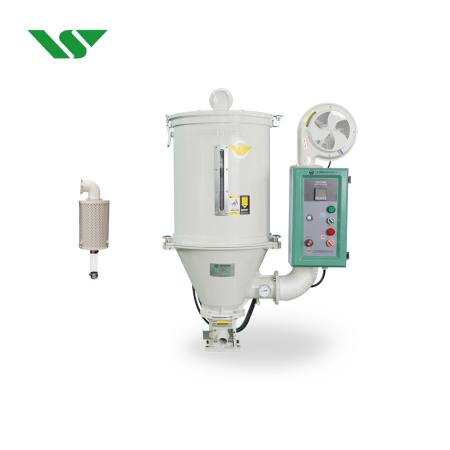Usage and Maintenance of Plastic Hopper Dryers for Injection Molding
2024-06-15 Page view:
In plastic processing, a plastic hopper dryer is essential for drying raw materials, specifically plastic particles. This device uses hot air circulation to evenly dry the particles, ensuring a high-quality drying effect. It features an intelligent temperature control system that adjusts parameters according to the drying requirements. For long-term, stable, and effective operation, correct usage and maintenance are crucial. This article provides detailed guidelines on using and maintaining a plastic hopper dryer, serving as a valuable reference for users.

1 How to Use a Plastic Material Dryer:
1. Initial Setup:
Before use, check that the power supply is normal and all connections are stable and reliable.
Adjust the plastic material dryer to the appropriate working temperature based on the type of plastic being processed, as different plastics require different drying temperatures.
2. Feeding:
Slowly pour the plastic particles to be dried into the hopper of the material dryer. Alternatively, use a suction machine to feed the material, reducing manual handling.
Ensure the hopper cover is tightly closed. Avoid overfilling to prevent adverse effects on the drying process.
3. Drying Process:
Turn on the power and start the plastic pellet dryer, which will operate according to the preset temperature and time.
Determine the specific drying time based on factors such as the humidity of the plastic and the amount being fed.
4. Completion:
Once the drying time is complete, turn off the plastic pellet dryer. The dried plastic particles are then ready for the next stage of processing.

2 Maintenance Precautions for a Plastic Injection Molding Dryer:
1. Regular Cleaning:
Over time, impurities will accumulate inside the injection molding dryer, affecting its performance and lifespan. Regular cleaning is essential.
Use a soft cloth or brush to remove dust from each component, taking care not to wet any electrical parts to avoid malfunctions.
2. Mechanical Inspection:
Regularly check the mechanical parts to ensure they are functioning correctly.
Pay attention to any abnormal sounds or heat from the motor or fan, and check the belt's tightness. Repair or replace parts as needed.
3. Ventilation:
Ensure the area around the hot air hopper dryer is well-ventilated. The hot air dryer generates heat and moisture during operation, which needs to be dissipated to avoid negative effects on the drying process.

Conclusion
Proper usage and maintenance are key to ensuring the long-term and effective operation of plastic dryers. By following these guidelines for reasonable operation, regular maintenance, and care, you can achieve ideal drying results and maintain high production quality.



